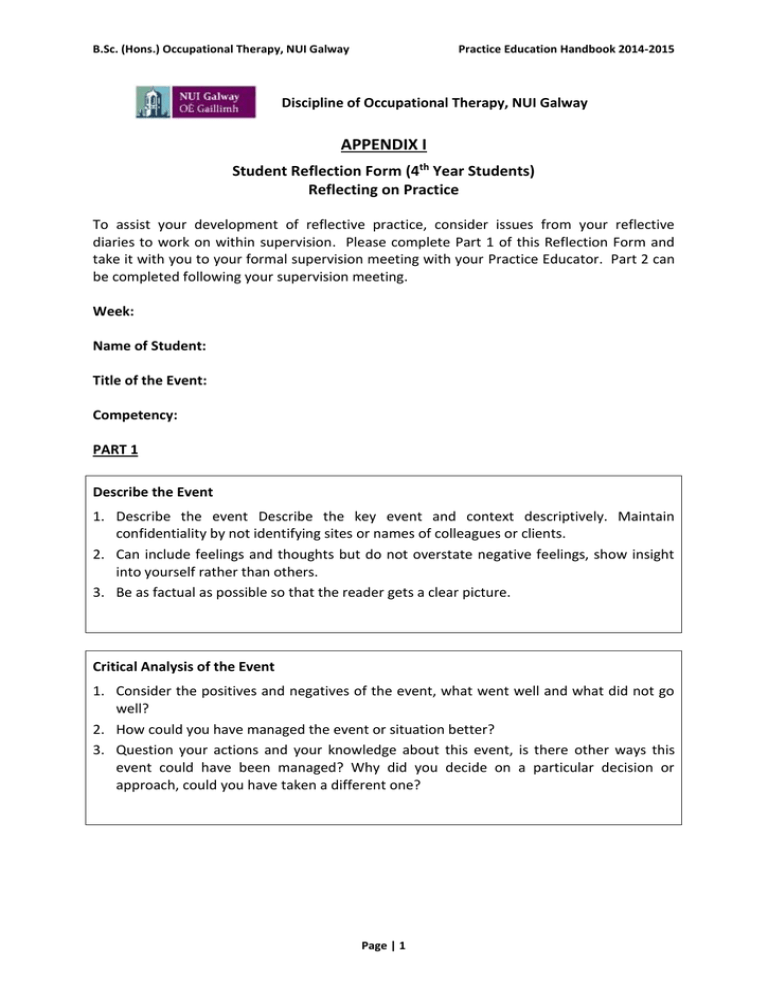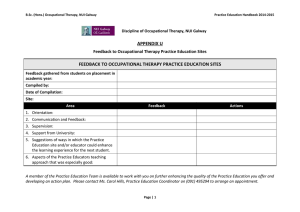APPENDIX I Student Reflection Form (4 Year Students) Reflecting on Practice
advertisement

B.Sc. (Hons.) Occupational Therapy, NUI Galway Practice Education Handbook 2014-2015 Discipline of Occupational Therapy, NUI Galway APPENDIX I Student Reflection Form (4th Year Students) Reflecting on Practice To assist your development of reflective practice, consider issues from your reflective diaries to work on within supervision. Please complete Part 1 of this Reflection Form and take it with you to your formal supervision meeting with your Practice Educator. Part 2 can be completed following your supervision meeting. Week: Name of Student: Title of the Event: Competency: PART 1 Describe the Event 1. Describe the event Describe the key event and context descriptively. Maintain confidentiality by not identifying sites or names of colleagues or clients. 2. Can include feelings and thoughts but do not overstate negative feelings, show insight into yourself rather than others. 3. Be as factual as possible so that the reader gets a clear picture. Critical Analysis of the Event 1. Consider the positives and negatives of the event, what went well and what did not go well? 2. How could you have managed the event or situation better? 3. Question your actions and your knowledge about this event, is there other ways this event could have been managed? Why did you decide on a particular decision or approach, could you have taken a different one? Page | 1 B.Sc. (Hons.) Occupational Therapy, NUI Galway Practice Education Handbook 2014-2015 Seeking and Reviewing Knowledge and Skills This can include seeking more knowledge from books or other academic resources or from other people e.g. your practice educator. You may need to seek to observe in a more formal way your practice educator/s or other professionals to further develop your understanding of this situation or you may have discussed this competency in supervision and your practice educator has given you information that is relevant. Are there alternative approaches, thoughts, considerations that you have found? Can you consider an alternative perspective? Reference the sources appropriately. PART 2 Initial Ideas and Sharing 1. What conclusions are you making 2. Describe them all if there are more than one, and identify which one has the most relevance to you and the work context. Give reasons for this choice. 3. What changes are required? If this is a cognitive change in you, describe what you would ‘think’ differently next time, but if there also are affective changes in your work practices, describe what you would ‘do’ differently next time. 4. If changes need to be recommended for the work context, in process or content, also describe these. Ask the question how could best practice be implemented in this context? If there is no evidence identify this as an area of future research. Report on the outcome of your plan and describe your new learning. Conclusion 1. What is your final decision about this event? 2. Has this process affirmed practice, given you a new perspective, is a change of practice in the work context indicated or is new research indicated? Summarise your conclusion. Impact on the Future List in bullet points what you now need to do to continue your learning, if appropriate. Page | 2

